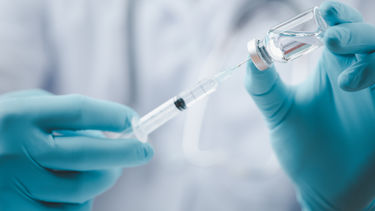The speed at which vaccines can be developed and manufactured is to be improved through a new manufacturing process, which will help to counter new diseases, and avoid another lengthy COVID-like experience. This is thanks to a new collaboration between researchers from the University of Sheffield and engineers at Amodo Design.
Supported by a new £2 million grant from Innovate UK, the researchers - led by the Department of Chemical and Biological Engineering’s Dr Zoltán Kis in collaboration with Amodo Design - aim to improve the production rates and volumes of ribonucleic acid (RNA) vaccines.
RNA vaccines, such as those used successfully in the COVID-19 pandemic, have the potential to be produced much faster than traditional vaccines. In the case of COVID-19, the development of an RNA-based vaccine took just 63 days from the release of the virus sequence to the first dosing in humans, leading to accelerated clinical trials and ultimately billions of doses being manufactured.
This rapid development was made possible thanks to RNA technology. Unlike traditional vaccine manufacturing techniques, RNA vaccines shift the most difficult and complex parts of manufacturing a vaccine to the human body, by teaching our cells how to make a protein that will trigger an immune response rather than delivering the protein itself.
The RNA is contained in lipid nanoparticles (LNPs), which ensures that these instructions can arrive intact inside our cells – a critical element of mRNA vaccine delivery and effectiveness.
These vaccines are still needed across the world, and there is a requirement to increase production rates and volumes and reduce manufacturing costs of RNA vaccines, whilst still maintaining consistently high product quality.
As it stands, the rate at which these vaccines can be developed and manufactured for large-scale human use is often limited by chemistry, manufacturing, and controls (CMC) - a set of procedures used to ensure the quality and consistency of drug products during manufacturing.
To remove this CMC bottleneck and unleash the potential of RNA to be used across any number of diseases while maintaining high standards, the researchers are taking a unique and innovative approach.
The project team will design and construct a fully-automated compact RNA manufacturing process: RNAboxTM. Moreover, a bespoke design space will also be established based on the Quality by Digital Design (QbDD) framework - an approach that involves rigorous control of product quality, based on a thorough understanding of the impact the manufacturing process has on product quality.
The RNAboxTM will allow for the production of different RNA sequences, translating into different products, using the same automated compact manufacturing process.
Once fully developed, the QbDD-enabled RNAboxTM will enable RNA for a huge number of use cases.
RNA material for basic research to study molecular mechanisms, biochemical and cellular signalling pathways, as well as disease mechanisms and formulation science studies.
Dr Kis, Senior Lecturer in the Department of Chemical and Biological Engineering, said: “The funding will allow us to develop a transformative manufacturing technology which will lead to epidemic/pandemic preparedness and improved health through prevention and treatment of diseases.”
The funding has been awarded as part of Innovate UK’s Small Business Research Initiative (SBRI), which is designed to provide funding for the development of vaccine candidates, technologies and platforms, up to and including phase one clinical trials.

